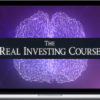Real Vision Academy – Real Investing
The Real Investing Course
Timeless investing principles from the world’s best investors.
The brand new Real Investing Course from Real Vision gives you tools to become a more successful investor in the real world.
You’ll learn from the world’s best investors and develop your own ‘nose’ for investing. All in less than 10 hours. And did we mention it’s bloody entertaining, too?
Thousands of Hours of Insight — Delivered in Less Than 10
Become a better and more confident investor by learning from the best.
Becoming a better investor is a lifelong journey. And not an easy one. You have to learn from the world’s best investors without blindly copying them.
You have to apply textbook knowledge in the real world (always tricky). You have to avoid charlatans (increasingly tricky). You have to avoid information and data paralysis.
Urgh.
All this pain is why we developed The Real Investing Course.
It’s game-changing — delivering insights you won’t find anywhere else from dozens of professional investors.
It’s super-charged — distilling thousands of hours of knowledge and delivering it to you in less than 10.
It’s lock, stock and barrel — Real Vision acquired and built on the Lex van Dam Trading Academy, a blockbuster investing course based on the frameworks developed at one of the top London trading desks.
Oh, and forget about bland PowerPoint presentations by somebody in a shirt…
The Real Investing Course is filmed in an underground bunker, a cinema, and a bar, so you know it’s definitely not boring…
What You’ll Learn In Real Investing?
The Game of Investing
It’s easy to think the Game of Investing is rigged, or that the markets (or their players) want to mess you up. Reality is that it’s about assessing inputs of information to generate money-making investments. Simple(!)
This 3-lesson module focuses on the broader game, some of its core rules, and some principles to help you navigate the playing field, the players, and the mistakes they make.
What You’ll Learn:
How to figure out your own investing style instead of relying on others
Why the idea of “Mr. Market” is B.S. (and so is the idea of an investing “holy grail”)
The actual first steps you need to take to conquer the inner game of investing
The 4 core market truths you need to put on a Post-It beside your computer
How to assess your ‘5 types of capital’ (not just your financial capital)
How to use context to rein in the wall of information we’re all bombarded with everyday
And more
At the End You Will:
Be an emotionally more self-aware investor… Learn (or confirm) your investing style… Curate your information diet wisely.
The Stuff That Drives Markets
Market drivers are a kind of Russian doll ecosystem, with a number of trends of various time horizons co-existing at any one point in time.
This 7-module lesson will give you a solid foundation in understanding co-existing (and seemingly conflicting) trends — because if the trends don’t make sense to you, you’ll feel in the dark with your portfolio…
What You’ll Learn:
The 3 broad categories of market drivers
How the hell you’re meant to integrate different categories of market drivers into one portfolio
Why you can get an edge by finding the trend inside the trend
The relationship between central banks and market drivers
How to juggle several time horizons at once
How to set and track market drivers yourself
At the End You Will:
Understand the ecosystem of market drivers… Know how to track market drivers yourself… Stress-test your portfolio with your new knowledge of market drivers.
The Art (& Science) of Charts
Like most tools in investing, charts need to be handled carefully and well if they are to help you stack the probabilities in your favor and manage risk well enough that you get to continue to play the game.
This 6-lesson module focuses on the value of charts as a tool in everyone’s framework.
What You’ll Learn:
Why charts are your “best friend and worst enemy all at once”
How to use charts to help you filter ideas and see a ton of information in one place
The classic mistakes investors make when using charts
Exactly why charts are not predictors of the future
How to identify a trend, key support, resistance levels, and more
Some common chart patterns including pennants, head-and-shoulders, flags, and triangles
And more
At the End You Will:
Understand common chart patterns… Know the “gotchas” of relying too much on charts… Be ready to use charts as a tool to inform your investing decisions.
The Asset Class Universe
The core asset class universe is made up of equities, fixed income, commodities, currencies, and digital assets.
This 7-lesson module focuses on getting to know that universe (and most importantly, how the ‘planets’ in the universe interact).
What You’ll Learn:
How to identify the common drivers behind asset price performance
A top-down framework to understand and manage the asset class universe
Why bonds are less intimidating than they may appear at first
How to get to know the relationships between equities, fixed income, commodities, currencies, and digital assets
How to apply asset class fundamentals to your own investing
And more
At the End You Will:
Understand the different players in the asset class universe… Know the relationships between all the players… Feel comfortable building hypotheses based on these relationships.
The Science (& Art) of Building a Portfolio
By now, you’ll have a solid foundation in charts, investing psychology, asset classes, and market drivers.
This 6-lesson module covers the entire process of portfolio management — from expressing a single trade idea to building a robust portfolio suitable to your needs.
What You’ll Learn:
The golden rules of risk management
The tricky game of understanding correlations in your own portfolio
How to think about and manage liquidity risk, volatility, and leverage
Why risk management and portfolio construction are perhaps the most important part of the whole investment process
How to approach portfolio construction based on your individual circumstances
And more
At the End You Will:
Feel more confident constructing and managing your own portfolio… Be able to apply the ‘rules’ of risk management… Be able to tailor your portfolio construction based on you instead of applying a general structure and hoping for the best.







